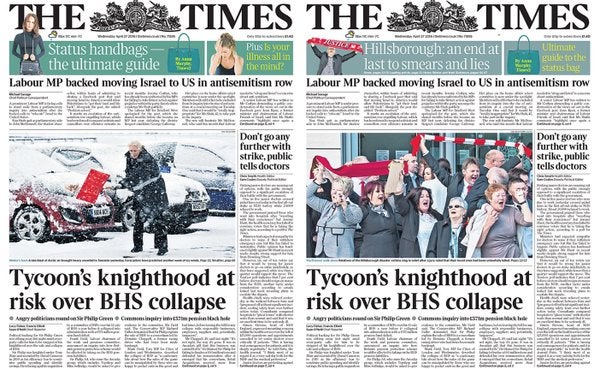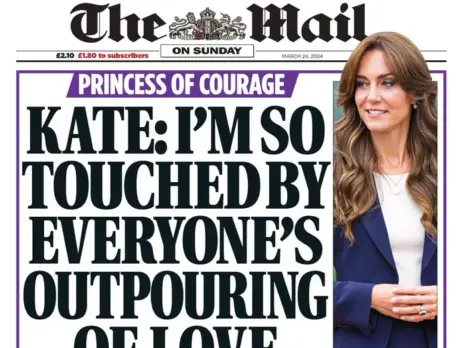
This blog post first appeared on the SubScribe blog, by former Times night editor Liz Gerard.
The Sun had no hope of getting it right. The Times got it spectacularly wrong. And then got it wrong again. And again.
There is now nothing anyone at London Bridge can do to heal the rift with Liverpool opened by that infamous Sun front page four days after the Hillsborough disaster 27 years ago.
With one bad decision, The Times has handcuffed itself to its pariah stablemate in a cell of opprobrium policed by the indignant righteous.
Rita Ora, a man shovelling snow, posh handbags, a couple of free theme park tickets, psychosomatic ailments: none of these was dispensable when it came to deciding where to put the Hillsborough inquest verdict.

What was the Sun to do? Give over the whole front page to the unlawful killing finding? If it had run a banner heading saying “We were wrong”, it would have been thrown back in its face. If it had run a “Justice at last” head, it would have been accused of hypocrisy. If it had put any other element on the front alongside Hillsborough, it would have been accused of underplaying the story, of showing disrespect. So, knowing it was on a hiding to nothing, it took what it presumably saw as the least worst option and left it off altogether.
Which might have been a strategy of sorts had it something decent to offer instead. A confected splash about the “scandal” of team Cameron’s tactics to keep their “EU plot” secret (excuse me, it’s not a plot, it’s government policy) doesn’t cut it.
And Rita Ora? My guess from research for a forthcoming magazine article is that there are algorithms showing that Ms Ora’s appearance on the front sells papers. But this wasn’t the day to keep plugging this “did she-didn’t she” nonsense about JayZ.
Bad decisions. To have any credibility as the country’s best-selling paper, it should have gone all out on the inquest, apologised again for its past, then put on a tin helmet and waited for the flak.

It was The Times, though, that really came a cropper.
It is nearly 20 hours since I saw that first edition front page and for most of that time I’ve been trying to get to the bottom of what happened. How could my old paper make such a monumental error?
While I’ve been fielding texts and DMs and emails and tweets from former colleagues, every other commentator has had their say.
So why write now? Is there anything to add? Shouldn’t I just let it go, as a friend advises? Well I’m clearly not doing that and I’ll come to the reasons later.
First, let’s try to understand what happened at The Times last night.
John Witherow is, by all accounts, a forceful editor who is not to be gainsaid. He was in the office yesterday, but left before the first edition went offstone to attend an awards function with Michael Heseltine and Peter Stothard’s farewell on the 17th floor of the Baby Shard.
Also in the office yesterday was one newlywed media magnate.
That single fact and the absence of Hillsborough from either of his daily newspaper front pages would be more than enough for the anti-Rupert brigade. Let’s all attack evil Murdoch and his lackey editors. For even if he didn’t tell Witherow and Sun editor Tony Gallagher what to do with the story, they might have been trying to please him.
It’s a theory. Never having worked for either editor, I have no idea what their relationship with the proprietor is, but I’d be surprised if Murdoch were particularly bothered about the story one way or another – certainly not enough to want it banished from The Times front page.
One version of events is that Hillsborough was slated for a front-page slot throughout the day, but was inexplicably dropped by the executives left in charge when Witherow left.
That’s a little hard to credit for such a micro-managing editor. As one observer said: “John looks at the front in the middle of the Atlantic. He’d certainly monitor it from the 17th floor.”
Another account says that one of those executives and the newsdesk argued consistently and in vain for the story, but that Witherow had ruled that he didn’t want it on the front because it was “old news”. Old news because it had been around since 11am or old news because the police cover-up had been rumbled years before?
Whichever it was, Witherow – who hasn’t responded to my inquiries on the matter – gave the impression of truly believing that it was not worth the front.
That was an extraordinary misjudgment for so experienced an editor and a most unfortunate call to get wrong. But every one of the dozen or so people who have contacted SubScribe about what happened last night was convinced that this was cock-up, not conspiracy (maybe the alternative was too awful to contemplate).
As one said: “Everyone was outraged. Witherow was the only one thinking along those lines. It seems that there are too many sycophants at the top level around him.”
Another said: “This is the inevitable outcome when an editor is too aggressive… They can’t be told anything and the backbench is too cowed to stand up to them.”
A third respected Times writer rued the omission, but was of the opinion that broadsheet fronts didn’t matter as much as tabloids and that “hopefully it will blow over”. He pointed to “good coverage inside”.
Yes, well that’s another thing. The first mention of Hillsborough comes on page 12, which either supports the theory that a proper page one story was intended or further demonstrates Witherow’s cavalier attitude to the subject. He dislikes football and reporter David Brown is said to have had a fight to be allowed to go to Warrington to cover the end of the inquest in person.
Mushroom scrumping in Epping Forest, a photograph of the actress Elizabeth Olsen in Shepherd’s Bush and a new treetop walkway at Westonbirt are all given precedence over the biggest story of the day.
If you want to see good coverage, read David Conn in the Guardian.

Henry Winter is reported to have intervened, and if it was he who brought about the change of heart, he will have earned his vast transfer fee in one action. Matt Dickinson is also said to have protested and Liverpool football correspondent Tony Barrett’s “unbelievable” tweet is there for all to see. But a senior executive told me that the Guardian report of a sports desk mutiny was inaccurate and I believe him – not least because of his reluctance to say anything else.
Experience tells me that editors, having made a decision, are more likely to heed outsiders than staffers playing the same record, so I backing Twitter over Winter. But thank goodness for whatever it was that prompted the rethink.
The next day there were huddles in corners and distraught executives, but Witherow was reported to have told everyone to forget about it. The PR department got involved and a statement was tweeted saying that a mistake had been made and been fixed.

That went down well.
“Fixed”. What a choice of word!
A misspelt name can be fixed. An error of judgment can’t. You can review what you’ve done and change your approach, but something that is fixed is put right. Who’s to say that the change was adequate?
And then, rather than retreat quietly, The Times’s social media team couldn’t resist tweeting links to the good elements of the paper’s Hillsborough coverage: the interactive biographies of the victims, Henry Winter’s excellent essay. Was this part of the PR strategy? If so, it was flawed.
For the Twitter sky emptied another hailstorm onto The Times, with the inevitable demands for contrition and apology.
Everyone must say sorry publicly for every lapse, real or perceived, these days. It’s nonsense, but you can’t blame the Twitterati for chirruping along with that chorus, given the strident demands from various newspapers – though not generally The Times – for apologies from all and sundry.
Apologies are not required to clear the air, to allow all parties to shake hands and move on. They are required for humiliation; the offender must be seen to grovel.

The Sun, it may be remembered, grovelled in September 2012 – a quarter of a century late – when it was shown conclusively that it had swallowed a pack of lies from the police about the victims of the disaster. It ran a front-page heading saying “we are profoundly sorry for false reports” and inside it described its “The truth” front page as the blackest day in the paper’s history.
It reproduced the offending front page and wrote:
It is to the eternal discredit of The Sun that we reported this misinformation [from the police] which tarnished the reputation of the Liverpool fans including the 96 victims.
Today we unreservedly apologise to the Hillsborough victims, their families, Liverpool supporters, the city of Liverpool and all our readers for this misjudgment.
The role of a newspaper is to uncover unjustice. To forensically examine the claims made by those who are in positions of power. In the aftermath of the Hillsborough tragedy we failed.
And by failing in our duty we heaped more misery on the families of those who lost their lives and the people of Liverpool. Nothing can excuse The Sun’s page one presentation under the headline The Truth.
It was inaccurate, grossly insensitive and offensive. This version of events was NOT the truth…
A newspaper that prides itself on serving ordinary working people betrayed their trust 23 years ago.
The people of Liverpool may never forgive us for the injustice we did them.
All we can do is offer them an unreserved and heartfelt apology that is profound, sincere and unambiguous.
Much good did it do the paper or its staff, who were barred from Hillsborough press conferences and subjected to further barrages of online abuse in retribution for the sins of others – sins committed when today’s bunch were in nappies or at school. The reappearance of Kelvin McKenzie, the man who presided over that 1989 calumny, as a columnist has not helped any hopes of rehabilitation.
It is this background that makes the error of judgment at The Times the more serious.
Whether it was the editor himself or one of his two unfortunate lieutenants who blundered, an apology is in order. Not to the baying masses on social media (I confess that I both tweeted and posted on Facebook my horror at that first edition front), but to the staff.
To Tony Barrett, whose already difficult job covering Liverpool FC for the paper has been rendered almost impossible. Indeed, I believe he may have resigned.
To Andrew Norfolk, whose magnificent work exposing the failings of that same South Yorkshire police force not three decades but three years ago brought justice for the abused girls of Rotherham. (Talking of Norfolk, why wasn’t he all over this story – or big gun Sean O’Neill or crime editor Fiona Hamilton?)
To all the reporters and subs and photographers who have been robbed of the pride they will have felt at seeing their paper improve and increase circulation while other titles lost their way.
How could such an apology be conveyed? In an email? In conference? At a meeting of all staff? Then what would happen? Someone would leak it to Private Eye – or the likes of me – and instead of being taken at face value, it would be ridiculed as The Sun’s effort was four years ago.
We live in unhappy, churlish times. This was a bad mistake and there is no acceptable way to atone.

That front page reinforces the impression that ordinary people in the North West don’t matter to arrogant privileged media types in London, that the Establishment can still get away with anything.
I can say with confidence that in previous eras, under the likes of Charlie Wilson, Peter Stothard, John Bryant and Ben Preston, a piece of writing with as much class and style as that produced by Henry Winter on Hillsborough would not have been buried on page 66. They might have made it the splash. There would certainly, at the very least, have been a big display quote from the front to direct readers to his work.
As a final example of why it all matters, I offer that here now:
The police froze, inhibiting the rescue operation. It was the Liverpool fans who were the heroes, leaning over from the tier above, pulling people to safety. It was Liverpool fans who were on the pitch, trying to resuscitate their friends. It was Liverpool fans who grabbed advertising hoardings to use as stretchers as the ambulance service reaction was insufficient. Yet it was the Liverpool fans whose reputation was besmirched by the police and The Sun, who wickedly alleged that supporters had misbehaved.
Email pged@pressgazette.co.uk to point out mistakes, provide story tips or send in a letter for publication on our "Letters Page" blog






